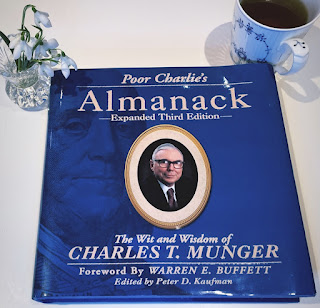How To Recover from An Investing Mistake
I was initially inspired by a story posted on Instagram in 2020 by Richard B. "Rich" Handler, Chief Executive Officer of Jefferies Group - an investment banking company. Rich Handler is not a value investor but I’m using this example because it’s solid advice and I’ve followed it myself (yes, I’ve made trading mistakes and other failures).
Everyone fails and from my point of view failing is important, however what is absolutely key is that you learn from your failures and don’t make the same mistakes over and over again. The way to learn from your mistakes is in this post, which is why I find Rich’s advice so valuable.
A way to find the root causes it to ask “why” five times. For example, “Why did I sell during a stock market crash” – come up with the answer: “because I panicked” and then ask one more time “Why did I panic in that situation?” and continue to drill down on the real issue by asking more “why”-questions. Remember to write everything down. If you want to learn more about The 5 Whys technique that was developed by Toyota there are many resources online both text and video material.
One thing I do to show self-compassion is to think about myself as a little child and give myself a mental huge comforting hug and smile (and I’m out of my comfort zone admitting this on my public blog but maybe this technique will help someone). While I’m good at the first 4 topics in this list, showing self-compassion is something I’m still practicing, and my beloved friend, actor Christian Wolf, shared this podcast episode with me to help me get from brutally honest to showing myself some self-care. Being Kind to Yourself, Hidden Brain
Everyone fails and from my point of view failing is important, however what is absolutely key is that you learn from your failures and don’t make the same mistakes over and over again. The way to learn from your mistakes is in this post, which is why I find Rich’s advice so valuable.
1) Write It Down
Rich Handler mentions that you should write down your trading mistakes and be brutally honest about everything you did wrong. He suggests making a comprehensive list of everything that went wrong and to reflect about the bigger picture and recurring themes – is there a theme in your life of these types of mistakes? It’s the larger issues that will enable you to learn.
A way to find the root causes it to ask “why” five times. For example, “Why did I sell during a stock market crash” – come up with the answer: “because I panicked” and then ask one more time “Why did I panic in that situation?” and continue to drill down on the real issue by asking more “why”-questions. Remember to write everything down. If you want to learn more about The 5 Whys technique that was developed by Toyota there are many resources online both text and video material.
2) Own It
It’s easy to blame others or to blame circumstances for the mistake, but if you know you made a bad decision it's time to face it and take full ownership. “Take accountability for your thoughts, strategies and decisions”, Rich Handler writes. Maybe you were lazy and didn’t do the checklist work, you were sloppy and didn’t double check your valuation or maybe you were careless and took a bet on a stock you didn’t know. Own whatever was at the core of the mistake.
But also know that some events are outside your control, and they aren’t your mistakes – these types of events are simply outside your circle of influence and there was no way that you could’ve anticipated it or done anything to prevent it. Random bad luck. Bad luck doesn’t happen much, but if you want to learn more about circle of influence, I recommend reading Stephen Covey’s 7 Habits of Highly Effective People.
But also know that some events are outside your control, and they aren’t your mistakes – these types of events are simply outside your circle of influence and there was no way that you could’ve anticipated it or done anything to prevent it. Random bad luck. Bad luck doesn’t happen much, but if you want to learn more about circle of influence, I recommend reading Stephen Covey’s 7 Habits of Highly Effective People.
3) What Could You Have Done Better?
Once you’ve been through the 5 whys and owned up to your mistake, it’s time to reflect and write down what you could’ve done better. The way I do this is to not only look back but to think about future situations, and what I should do next time to mitigate the risk of making the same mistake again. For example, if the mistake was to panic sell, you can make a rule of placing trades when the stock market is closed, and you’re calm and in a peaceful space to not get carried away.4) Share
It’s super important to have a peer or a group of friends to share your mistakes with. Where it’s ok to share fails and sometimes you might get valuable advice from them and words of encouragement to stay strong. Rich Handler is from the investment banking industry, so he suggests talking to a boss or peers. But since most of you readers are independent investors like me, you'll need some friends and you might not have that right now. I suggest that you find some friends that you can talk to about investing. Maybe you already have friends that are investing but haven't yet had the courage to reach out to or maybe you need to find new friends. I found my friends through investing courses, and you can do the same.5) Show Self-Compassion
As Rich correctly writes in his Instagram story, it’s important to forgive yourself because failures are here to stay. My own boss at LEGO Group, Tormod Askildsen, used to say that if you’re focused on not failing, you’ll never accomplish anything. I agree and to me the ultimate form of failure is only to not learn from one’s mistakes.One thing I do to show self-compassion is to think about myself as a little child and give myself a mental huge comforting hug and smile (and I’m out of my comfort zone admitting this on my public blog but maybe this technique will help someone). While I’m good at the first 4 topics in this list, showing self-compassion is something I’m still practicing, and my beloved friend, actor Christian Wolf, shared this podcast episode with me to help me get from brutally honest to showing myself some self-care. Being Kind to Yourself, Hidden Brain
6) Move On
“What appears to be the biggest problem in the world today is usually forgotten tomorrow”, Rich Handler writes and encourages people to focus on being optimistic, hard-working and a good person. “That’s what matters”, he says, and a trading mistake will soon be forgotten in the greater scheme of things, and as I usually say: if you’ve learned, you’ve lived!The original text from Instagram is unfortunately not available anymore but I have saved a copy of the content. This is not a transcription of the original content but Rich's advice through my own learnings and lens.
The link to Steven Covey's book is an affiliate link. If you buy the book using the link, I will get a commission. I only share link to books and content I truly recommend.






Comments
Post a Comment